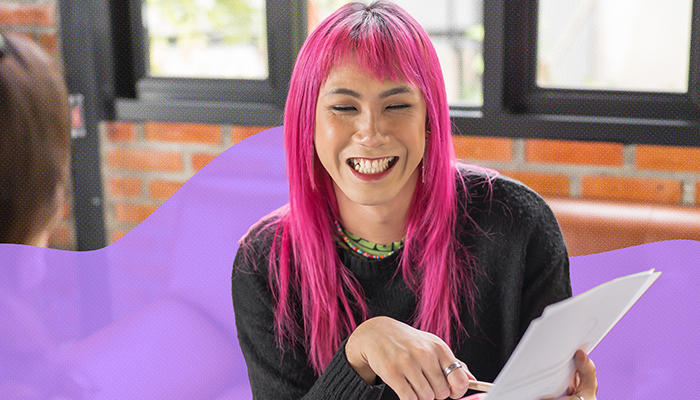This article was clinically reviewed by Haley C., FNP.
Every fall, we’re reminded of the importance of protecting ourselves and others by getting our annual flu shot and COVID vaccine. These vaccines are essential for preventing serious illness, especially for those most at risk, like older adults, people with chronic conditions, pregnant people, or anyone with weakened immune systems.
Lately, many people are experiencing what’s known as vaccine fatigue—feeling overwhelmed by the need to get yet another shot. Unfortunately, this has led to a decrease in vaccine uptake, particularly among those at higher risk. The result? More flu- and COVID-related hospitalizations, which could have been avoided with simple prevention measures. By getting vaccinated, you not only protect yourself but also reduce the risk of spreading illness to those who may not be able to fight it off as easily.
Getting vaccinated isn’t just about individual protection—it’s about contributing to herd immunity. This helps protect the most vulnerable members of our community, including people who can’t get vaccinated due to medical conditions. When you get vaccinated, you’re playing a crucial role in keeping our communities healthier and safer. Did you know? LGBTQ+ adults have a higher rate of being vaccinated with the 2023-24 COVID vaccine than cisgender straight adults, so let’s keep it going!
Read on to learn more about where and when to get your shots, and get answers to some common questions.
For information on where to get your vaccines, visit the CDC’s Vaccine Finder or your local health department’s website.
When should I get vaccinated?
When it comes to the flu shot and COVID vaccines, timing is important. It’s best to get vaccinated early in the fall (late September / early October)—ideally before flu season peaks. Another thing to think about is if you have an upcoming social event where you might be around a large crowd or immunocompromised friends. If you’ve got a Halloween party or wedding coming up, you’ll want to make sure you get vaccinated before. It can take up to two weeks for the vaccines to become fully effective so don’t wait until the last minute to protect yourself.
Why do I need a flu shot and COVID vaccine every year?
Both the flu and COVID vaccines are updated regularly to be most effective against the latest strains. Viruses like the flu mutate quickly, meaning last year’s vaccine might not be as effective against this year’s strain. That’s why it’s crucial to stay up to date—each new vaccine is designed to offer the best protection for the current season. It’s the safest and most effective way to reduce your risk of catching the flu or COVID and can lessen the severity of symptoms if you do get sick.
Can the flu shot give me the flu?
One of the most persistent myths about the flu shot is the belief that it can actually give you the flu. Let’s set the record straight: the flu shot cannot give you the flu. The vaccine is made from inactivated or severely weakened viruses, which means they can’t cause an infection.
So, why do some people feel under the weather after getting the flu shot? This is often due to the body’s immune response. When you receive a vaccine, your immune system goes to work, creating antibodies to protect you from the actual virus. This process can sometimes cause mild, flu-like symptoms such as soreness at the injection site, a low-grade fever, or muscle aches. These side effects are typically mild and only last a day or two. It’s a sign that your body is building immunity, not that you’re getting sick. Also, keep in mind that it takes two weeks for the vaccine to build immunity, so if you are exposed during that two week period you can still get the flu.
Do I need a COVID vaccine when I’ve already had multiple doses in the past?
You may wonder why you need to continue getting COVID vaccines after already receiving doses in the past. The COVID-19 virus, like the flu, mutates over time, creating new variants. Some of these variants can be more contagious, cause more severe illness, or partially evade the immunity gained from previous infections or vaccinations. Each updated vaccine is designed to better protect against the newer variants circulating at the time. Immunity also wanes over time as the level of antibodies your body produces decreases, so it’s important to stay up to date with your COVID vaccine.
Where can I get vaccinated?
There are many places you can get your flu shot and COVID vaccine. In many cases, you can even get them both at the same time. Whether you have insurance or not, there are options available to make sure you’re covered (most insurance plans will cover these vaccinations, but check with your plan to make sure). Here are some places that might provide vaccinations:
Local pharmacies
Your local pharmacy, and even some grocery stores with pharmacies inside, will offer flu shots and COVID vaccines, often without the need for an appointment. Many of these locations allow you to schedule an appointment online to save time, so check the pharmacy website to book. You can often get both vaccines at the same time.
In-person primary care or wellness visits
Many healthcare providers offer flu and COVID vaccines during routine visits, so if you’re scheduling an annual physical or wellness check-up in person, ask if you can get vaccinated at the same time. This is especially convenient because your provider can also answer any health-related questions you have about the vaccines, side effects, or your specific medical conditions. While we can’t offer vaccines through telehealth, your FOLX primary care provider can help you find a place to get them.
Urgent Care
Many urgent care centers offer vaccinations. This option is great if you can’t get an appointment with your primary care provider or if you need a last-minute vaccination.
Workplace Vaccination Clinics
Some employers offer on-site flu vaccination clinics for their employees, especially in larger companies. It’s worth checking with your HR department to see if your workplace provides this service.
Community Health Centers and Public Health Departments
For individuals without insurance or those looking for low-cost options, community health centers often provide free or discounted vaccines. These centers are focused on providing care to underserved populations and may offer a sliding scale for payment based on income. Your local public health department may also have free or low-cost vaccination clinics, particularly during the fall. They may be held at public schools, community centers, or libraries. Check the website for your county or city’s public health department to see if they have anything coming up.
Universities and Schools
For college students, many universities offer free or low-cost flu and COVID vaccines on campus. Check your school’s health services or student affairs office for information on vaccine clinics.
Getting your vaccines is a simple, effective way to protect your health and reduce the risk of severe illness for those around you. This fall, take a moment to schedule your flu shot and COVID vaccine, and encourage your loved ones to do the same. Let’s fight vaccine fatigue together and keep our communities strong.
--------
FOLX Health is the first digital healthcare company designed by and for the LGBTQIA+ community. Our services include primary care, gender-affirming hormone therapy including estrogen and testosterone (HRT), mental health care, sexual and reproductive health care, and fertility consultations. FOLX memberships give you access to LGBTQIA+ expert clinicians, peer support, thousands of LGBTQIA+ resources, and more. Whether you’re lesbian, gay, bisexual, transgender, queer, gender non-conforming, nonbinary, or another identity, you can find LGBTQ-specialized health care that helps you meet your wellness goals. Get all the benefits of becoming a FOLX member and sign up today!



